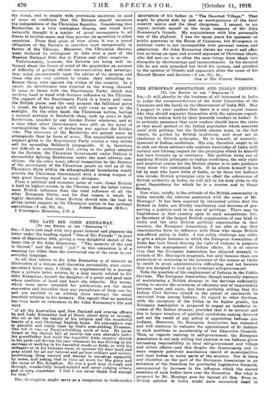THE LATE SIR JOHN KENNAWAY.
(To THE EDITOR OF THE " SPECTATOR.")
Set,—I have just read with very great interest and pleasure the letter under the heading signed " One of His Friends " in your issue of September 20th, giving a very delightful sketch of the home life of Sir John Kennaway. " The memory of the just is blessed," and the word " just" in this connexion is of a meaning far wider than the contracted use of the term in our everyday language.
As all that relates to Sir John Kennaway is of interest as illustrative of a unique and charming personality, your corre- spondent's letter may, I think, be supplemented by a passage from a private letter written by a lady nearly related to Sir John Kennaway, herself the daughter of a great and good man whose qualities of head and heart she inherits. Her words, which were never intended for publication, are far more expressive and beautiful than any paraphrase of them can be, and are entitled to an abiding place amongst the many heartfelt tributes to his memory. She regrets that no mention has been made in references to Sir John Kennaway's life and work
" of all the Australian and New Zealand and oversee officers he and Lady Kennaway had at Eseot, about sixty or seventy, who all so felt the beauty of his religion and the wonderful beauty of a real Christian English home. Its atmosphere was so peaceful and really blest by God's ever-abiding Presence. One felt it was an Empire-building work of love. He never forgot at the church bell at twelve—his own church's bell— his grandfather had built the beautiful little country church in his park—all during the year whenever he was driving in his carriage or walking in his beautiful woods or fields, or with his oottagers or in his business room, to uncover his dear head and pray aloud for all our beloved and gallant soldiers and sailors, mentioning those nearest and dearest to ourselves especially by name, and asking God to bless all work for His glory and the cause of His Kingdom. He was a good man through and through, wonderfully broad-minded and never judging others, and so very consistent. I feel I can never thank God enough for him."
This description might serve as a companion to Goldsmith's
description of his father in " The Deserted Village." They might be placed side by side as word-pictures of the ideal country squire and the ideal clergyman. I cannot, to my regret, include myself in the large company of Sir John Kennaway's friends. My acquaintance with him personally was of the slightest. I was for many years his opponent on public questions in the House of Commons, but divergence in political views is not incompatible with personal esteem and admiration. Sir John Kennaway claims my respect and affec- tion as being an open and avowed exponent of Christian ideals, who did not—as is so often the case—bring these ideals into disrepute by shortcomings and inconsistencies. In his elevated life he not only preached but lived his sermon, and glorified in the opinion of friends and opponents alike the cause of his Blessed Master and Saviour.—I am, Sir, &c.,
ONE OP His FORMER OPPORIDTTE.


































 Previous page
Previous page